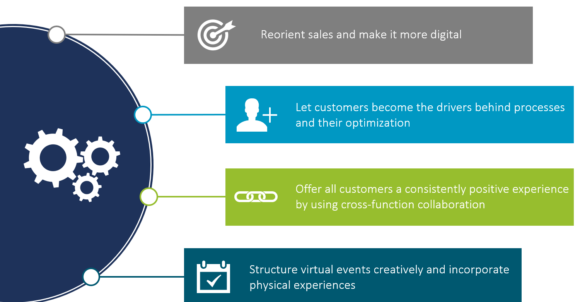Representatives of the industry agree that 2021 is going to be a challenging year for medical technology sales. What exactly are the challenges, and how can we turn them into chances? The year 2019 witnessed strong sales, but the coronavirus pandemic impacted the medical technology sector as well in the year 2020. Across the industry, annual sales shrank by up to 10% owing to the declining numbers of orders received. According to BVmed, small and medium-sized medical technology enterprises were impacted in particular. They constitute 93% of the industry in Germany. Changes in sales and service are particularly noticeable in the companies themselves. In the study COVID-19 Sales Pulse Check, a majority of the sales managers who were surveyed indicated that the current coronavirus crisis posed a great challenge, perhaps even the greatest challenge they had encountered in their careers to date. But how should sales respond to the current situation?
What needs to change in sales?
The results of the study mentioned above convey an alarming image: Many of the daily tasks in sales and service are severely limited as a result of contact restrictions. Typical travel activities and personal contact with customers hardly take place anymore. For instance, if a company sells complex medical products, they often cannot be commissioned on the customer’s premises at this time. Companies need to find new solutions in order to continue to guarantee delivery dates and commissioning. That is why communication with customers is more important than ever before. The goal is to continually be in contact with customers and to be able to address their problems and challenges. These challenging times mean that sales must be reoriented and digitalized so it can fulfill its tasks. Existing processes need to be adapted to the new circumstances, and new processes must be introduced. Companies need to closely scrutinize existing methods and introduce new procedures as required. Sales methods such as remote selling or social selling are important components of digitalized sales and must form part of a new orientation.
How to reorient sales?
The fact that sales needs to adapt to changing requirements is an issue that comes up time and again. Since time immemorial, new technologies have been used in sales and provide for corresponding process improvements. This also applies to today’s digital reorientation. Some companies have already begun this reorientation and are currently digitalizing and automating sales processes. The fall survey carried out by BVmed confirms that digital process optimizations in sales, as well as digital networking and communication with customers, are among the most frequently used digital solutions during the coronavirus pandemic. However, individual digital solutions will not be enough. Companies need an overall strategy for reorienting their sales. The Covid-19 Sales Pulse Check study succeeded in defining specific measures for managing the crisis and reorienting sales. The sales managers who were surveyed identified the following points as the most important measures:
- Digitalization of marketing and sales processes (“Sales 4.0”)
- Optimizing cooperation between sales and marketing in order to be able to perform customer-centered campaigns
- Virtual events should be offered and professionalized
These results clearly illustrate the trend concerning digitalization and process optimization in sales. Cross-study analyses identified the coronavirus pandemic as a driver pushing digitalization forward. In light of the current challenges, companies should seize the chance to drive digitalization in their operations forward in order to come out of the crisis stronger.
Opportunities offered by digitalization
The measures and learnings identified clearly indicate the areas where sales has the greatest potential as well as the greatest need for action.
Sales 4.0
The topic of sales process digitalization is extremely relevant in the field of medical technology as well. No matter how good a product is, nowadays manufacturers can no longer persuade customers by using product focus only. Business processes need to be oriented towards customers and their needs; “customer experience management” is a key phrase in this regard. Only companies that pursue a customer-oriented perspective through and through will manage to retain existing customers and acquire new ones. That is why their goal should be to set up hybrid sales. This form of sales offers customers a completely positive experience both online and offline. Customers feel that they are properly attended to and understood across all touchpoints. In order to realize this goal, the touchpoints need to be implemented with information and services that are tailored to the customers. Information about the actual customers is the prerequisite for a personalized customer address. Automation can simplify the data generation process considerably and save resources. Place your trust in new technologies, and structure your sales process consistently, transparently, and in a customer-oriented manner. In the service area as well, you can use modern tools like predictive maintenance to improve the services you perform and increase customer satisfaction at the same time. Using features that recognize error and wear and tear can minimize costly medical device failures that entail many risks. If the customer is satisfied with the services performed and the service employee, the potentials offered by cross-selling and up-selling can be exploited. Sales and service grow together and are oriented towards customers and their needs.
Optimized collaboration between sales and marketing
The topic of customer experience also gives sales and marketing an opportunity to work more closely together. A shift from silos and strong hierarchies to process-related ways of thinking that are focused on customers can be observed in companies. The Gartner Marketing Predictions for 2021 see sales, marketing, and customer experience management working increasingly closely together. In the future, the three areas of activity will merge in many companies. It is a good idea to use and expand the synergies between sales and marketing. After all, sales has specific knowledge about customers that can be used to develop perfectly tailored marketing measures. At the same time, marketing generates and qualifies leads for sales. That way, there is nothing standing in the way of successful new customer acquisition. The collaboration between sales and marketing should also take place at the system level. Benefit from your CRM system and integrate marketing automation solutions. By doing so, you can monitor, analyze, and optimize the sales process as a whole.
Virtual events 2.0
In keeping with the spirit of the times, in the Covid-19 Sales Pulse Check study the sales managers expressed a desire to offer virtual events and professionalize them. At the beginning of the coronavirus pandemic, all events and trade shows were canceled from one day to the next. The switch to webinars, livestreams, and virtual event platforms took place very quickly. However, on-site event formats cannot be translated directly into virtual ones. New concepts are needed for a good and varied range of virtual events. That is why you should focus on the opportunities offered by virtual events and expand them. Use both the new reach you have gained and the unlimited number of participants, and excite them with new formats. According to the Gartner Marketing Predictions for 2021, companies should try to make experience-oriented events possible. That is why Gartner recommends integrating physical experiences into virtual events in order to make a comprehensive customer experience possible. Gartner maintains that cross-function collaboration is necessary in order to implement this.
Conclusion
The year 2021 is going to be challenging for medical technology sales. But it also offers many chances. Companies that make an effort and make the right changes now will be the winners at the end of the year: 

